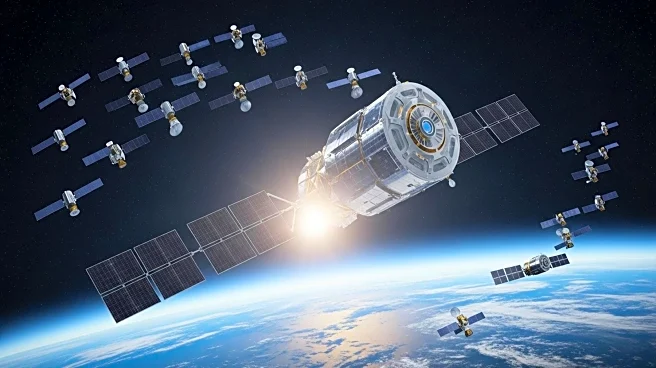What's Happening?
SpaceX successfully launched 24 Starlink broadband satellites into polar orbit from Vandenberg Space Force Base on Friday evening. The launch was conducted using a Falcon 9 rocket, marking the fourth and final Starlink mission from California in August. The Falcon 9 rocket, equipped with the first stage booster B1082, took off at 9:59 p.m. PDT. This booster has previously been used for national security payloads and other Starlink missions. After approximately 8.5 minutes post-liftoff, the booster landed on the drone ship 'Of Course I Still Love You,' achieving its 147th landing on this vessel and the 496th booster landing overall. SpaceX has launched 27 Starlink missions from Vandenberg in 2025, contributing to a total of 106 orbital missions this year, with a goal of reaching 170 launches by the end of the year. The company continues to expand its Starlink constellation, which now includes over 8,200 satellites, providing internet services to more countries and territories globally.
Why It's Important?
The successful launch of additional Starlink satellites is significant for global internet connectivity, particularly in remote and underserved areas. SpaceX's Starlink project aims to provide high-speed internet access worldwide, which can bridge the digital divide and enhance communication infrastructure. The expansion of the satellite network supports SpaceX's goal of offering reliable internet services to regions lacking traditional broadband infrastructure. This development is crucial for economic growth, education, and emergency services, as it enables better access to information and resources. Additionally, the frequent and successful launches demonstrate SpaceX's growing capabilities in space technology and its commitment to advancing satellite internet services.
What's Next?
SpaceX plans to continue its aggressive launch schedule, aiming for 170 orbital missions by the end of the year. This includes further expansion of the Starlink constellation to enhance global internet coverage. As more satellites are deployed, SpaceX will likely focus on improving service quality and expanding its customer base. The company may also explore partnerships with governments and organizations to provide internet services in areas with limited connectivity. Stakeholders, including telecom companies and internet service providers, will be closely monitoring these developments, as they could impact market dynamics and competition in the broadband industry.
Beyond the Headlines
The expansion of satellite internet services raises questions about space debris and the long-term sustainability of satellite constellations. As more satellites are launched, the risk of collisions and space debris increases, necessitating effective management and regulatory measures. Additionally, the growing presence of private companies in space exploration and technology highlights the need for international cooperation and policy frameworks to ensure responsible use of space resources. These developments could influence future discussions on space governance and the role of private entities in global connectivity.










